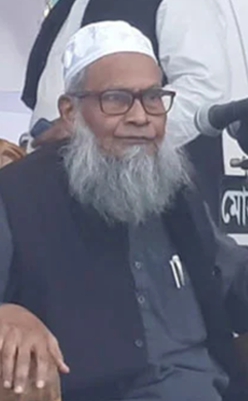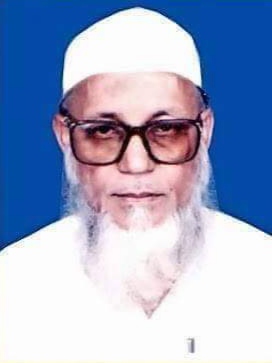Related Research Articles

The Deobandi movement or Deobandism is a revivalist movement within Sunni Islam that adheres to the Hanafi school of law. It formed in the late 19th century around the Darul Uloom Madrassa in Deoband, India, from which the name derives, by Muhammad Qasim Nanautavi, Rashid Ahmad Gangohi, and several others, after the Indian Rebellion of 1857–58. They consider themselves the continuation of Ahlus Sunnah wal Jamaat. The main purpose of this movement was to reject the grave worshipping, shirk and protect the orthodoxy of Islam from Bidah, as well as the influence of non-Muslim cultures on the Muslim of South Asia. The movement pioneered education in religious sciences through the Dars-i-Nizami associated with the Lucknow-based ulema of Firangi Mahal with the goal of preserving traditional Islamic teachings from the influx of modernist, secular ideas during British colonial rule. The Deobandi movement's Indian clerical wing, Jamiat Ulema-e-Hind, was founded in 1919 and played a major role in the Indian independence movement through its participation in the Pan-Islamist Khilafat movement and propagation of the doctrine of composite nationalism.

The Barelvi movement, also known as Ahl al-Sunnah wa'l-Jamaah is a Sunni revivalist movement following the Hanafi and Shafi'i schools of jurisprudence, and Maturidi and Ashʿari schools of theology with strong Sufi influences and with hundreds of millions of followers. It is a broad Sufi-oriented movement that encompasses a variety of Sufi orders, including the Chistis, Qadiris, Soharwardis and Naqshbandis as well as many other orders and sub-orders of Sufism. They consider themselves to be the continuation of Sunni Islamic orthodoxy before the rise of Salafism and Deobandi Movement.

Jamia Ashrafia, Lahore, Pakistan, is a religious educational institution founded by Mufti Muhammad Hassan in 1947. The university has produced numerous scholars of Islam, serving various sectors of life.

Arshadul Qadri was a Sunni Islamic scholar, author and missionary activist in India associated with the Barelvi movement who established several educational institutions and organizations in India.

Al Jamiatul Ashrafia is a Sunni Madrasa in India. It is located in Mubarakpur in a Northern State of India, Uttar Pradesh.

Muhammad Qasim Nanautavi was an Indian Sunni Hanafi Maturidi Islamic Scholar, theologian and a Sufi who was one of the main founders of the Deobandi Movement, starting from the Darul Uloom Deoband.
Al-Mustafa Centre, officially Al-Mustafa Cultural and Educational Centre (AMCEC), is a community organisation based in Bradford, West Yorkshire, England.

Dr Allama Khalid Maḥmūd was a Pakistani Sunni Islamic scholar who served as a Justice of the Supreme Court of Pakistan. He established the Islamic Academy and City Jamia Masjid in Manchester, England, and was best known for his works related to the Finality of the Prophethood.

Qamaruzzaman Azmi, also known as Allama Azmi, is an Indian Islamic scholar, philosopher and speaker. He is president of the World Islamic Mission. From 2011 to 2021, he was listed in The 500 Most Influential Muslims in the world by the Royal Aal al-Bayt Institute for Islamic Thought due to his efforts to build organisations and institutions, mosques, colleges, and universities for over five decades. He is the patron in chief of Sunni Dawat-e-Islami, an Islamic movement having branches around the world.
Al-Jame-atul Islamia is an Islamic seminary of Sunni-Barelvi Muslims in India. It is located in Raunahi, Ayodhya District, near Lucknow, in the north Indian state of Uttar Pradesh in India.

Darul Uloom Jamia Nizamia Ghousia is an Islamic seminary for Sunni Muslims. It was established by Mohammad Abdul Ghafoor Hazarvi, where he served as the Mohatmim and Grand Mufti. His son Mufti Abdul Shakoor Hazarvi took over as Mohatmim until April 2010. The Jamia is known for the great Ulama and Huffaz of Quran and Hadith it produced. It continues the tradition of the Darul uloom system initiated by Darul Uloom Bareily.
Yaseen Akhtar Misbahi was an Indian Sunni Sufi Islamic scholar and journalist, associated with the Raza Academy. He was the vice-president of the All India Muslim Personal Law Board and the chairman of All India Muslim Majlis-e-Mushawarat. He was an alumnus of Al Jamiatul Ashrafia and authored books including Angrez-nawazi ki Haqeeqat.
Pir Syed Jamaat Ali Shah was a Pakistani Author, Islamic scholar and Sufi saint of the Naqshbandi Order. He Presided the All India Sunni Conference and leaded the Movement for Shaheed Ganj Mosque. He was a contemp of Ahmed Raza Khan Barelvi, the founder of Barelvi movement.
Shukrullah Mubarakpuri was an Indian Sunni Islamic scholar. He was a leader and political activist in the Indian independence movement.
Zia ul Mustafa Aazmi Qadri Razvi Amjadi is an Indian Islamic scholar, teacher, orator, debater, Muhaddith and Faqih and is currently serving as Naa’ib Qaazi ul Quz’zat fil Hind under Mufti Asjad Raza Khan, who is considered to be the Grand Mufti Of India by the Barelvi movement.
Muhammad Alauddin Siddiqui was an Islamic Sufi scholar and social personality.
Karāmat ʿAlī Jaunpūrī, born as Muḥammad ʿAlī Jaunpūrī, was a nineteenth-century Indian Muslim social reformer and founder of the Taiyuni movement. He played a major role in propagating to the masses of Bengal and Assam via public sermons, and has written over forty books. Syed Ameer Ali is among one of his notable students.

Abdus Salam Chatgami was a Bangladeshi Islamic scholar, educator, writer and researcher. He was considered one of the prominent Islamic scholars of South Asia for his research work. Chatgami had served as the Grand Mufti in both Pakistan and Bangladesh.

Shamsuddin Qasemi was a Bangladeshi Islamic scholar, politician, author and educationist. He was the founding president of the Khatme Nabuwwat Andolan Council, former secretary-general of Jamiat Ulema-e-Islam Bangladesh, former principal of Jamia Madania Chittagong and Jamia Hussainia Arzabad, and the founding chief-editor of the monthly Paygam-e-Haqq and weekly Jamiat magazines. He is also noted for his contributions during the Bangladesh Liberation War of 1971.
Badre Alam Merathi was a mid-twentieth-century hadith scholar and poet originally from Meerut, initially migrated to Pakistan and eventually settled in Medina. Best known as the interpreter of Anwar Shah Kashmiri's teachings, he was a disciple of both Kashmiri and Shabbir Ahmad Usmani. Educated at Mazahir Uloom and Darul Uloom Deoband, he taught at both institutions and Jamia Islamia Talimuddin. During his tenure at Jamia Islamia Talimuddin, he compiled Fayd al-Bari, a four-volume Arabic commentary on Sahih al-Bukhari, published in Cairo with financial support from Jamiatul Ulama Transvaal, considered a masterpiece in hadith commentary. He was also associated with Nadwatul Musannifeen and authored Tarjuman al-Sunnah, a 4-volume hadith explanation designed for contemporary needs, widely acknowledged in academic circles. In his final years, he focused on teaching hadith in Prophet's Mosque, where many South Africans pledged allegiance to him, expanding his spiritual influence in South Africa.
References
- ↑ Spencer, Robert B. (28 October 2008). Stealth Jihad: How Radical Islam Is Subverting America without Guns or Bombs. Regnery Publishing. ISBN 978-1-59698-556-8.
- ↑ "Manchester Central Mosque". Manchester Central Mosque. Retrieved 30 October 2023.
- ↑ "Jamia Al-Karam graduates and former students serving a community near you – Al-Karam". 20 June 2016. Retrieved 30 October 2023.
- ↑ "Hundreds of Muslim children march to Manchester Arena to honour terror attack victims". www.9news.com.au. 27 May 2017. Retrieved 30 October 2023.
- ↑ Alam, Arshad (March 2008). "The Enemy Within: Madrasa and Muslim Identity in North India". Modern Asian Studies. 42 (2–3): 605–627. doi:10.1017/S0026749X07003113. ISSN 1469-8099.